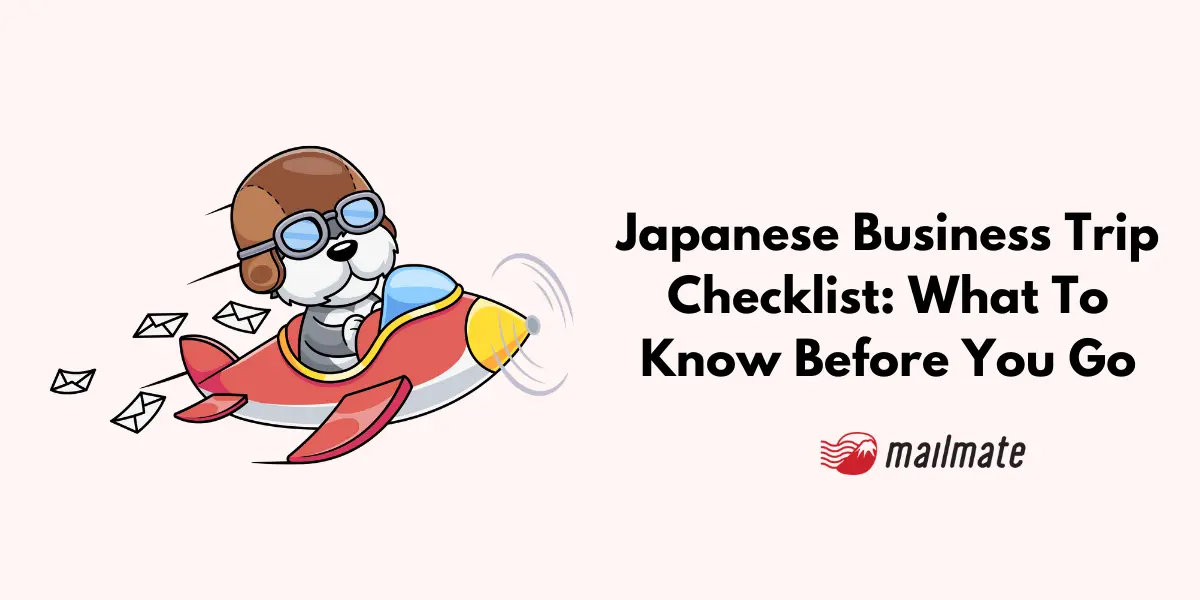Japanese Business Trip Checklist: What To Know Before You Go

Got an upcoming business trip to Japan?
Here is a checklist to be ready for your Japanese business trip.
1. Understand Japanese business etiquette.
Understanding Japanese business culture is one of the best ways to have smooth business transactions and build respectful, professional relationships on your trip.
a) Japan business card etiquette
In the Japanese business world, they have a unique way of exchanging business cards.

In summary, the introductions start with the team member who has previous communication with the client. The business card exchange starts with the highest-ranking individual followed by the subordinates.
When you receive a card, take a moment to look at it before carefully placing it in your business card holder.
Additionally, you must have enough business cards to hand out on your business trip.
b) Japanese seating arrangement etiquette
In Japanese business culture, the seats furthest from the door are for the most senior individuals, while the seats closest to the door are for juniors.
Japanese seating arrangements also involve where to sit in the taxi and the elevator.
Understanding these arrangements will enhance your current and upcoming business relationships.
c) Japanese omotenashi
The Japanese term “omotenashi” roughly translates to hospitality and is one of the major aspects of Japanese culture.
Thus, when going on a business trip in Japan, you will usually be taken out for dinner and drinks for post-meeting socialization.
While the Japanese clients will offer to pay, it’s always best to make an effort to share the experience to showcase your hospitality.
d) Gift giving
In Japan, giving gifts is one of the best ways to show appreciation and connection. To create a gift basket for your client, consider bringing handcrafted goods, fine beverages, or regional sweets from your home country.
This thoughtful gift will start your client meeting positive rapport.
2. Know your visa and entry requirements.

Depending on your visa, there are different entry requirements to know. So here, we quickly go over the 4 different types of Japanese business visas you can have.
a) Japan investor visa
This visa is for foreign entrepreneurs looking to invest or manage a business in Japan.
At a minimum, you will need:
¥5,000,000 investment
a physical office space
employing two full-time Japanese nationals
a co-director residing in Japan
relevant professional experience
a detailed business plan
business licenses
The process involves forming a company, applying for a Certificate of Eligibility (COE), and then converting the COE into an Investor Status of Residence (SOR).
For more details, look at this article: The Japan Investor Visa, Explained.
b) Japan startup visa
The Japan startup visa is for foreign entrepreneurs to stay in Japan for one year to support regional economic growth and startup culture.
Unlike the Japan investor visa, you do not need capital investments, physical office space, or a registered company.
Instead, applicants will need a strong business plan, especially for industries like fintech and healthcare.
The application will be evaluated based on the business's potential and the entrepreneur's background, while you will submit other documents to the local Japanese government in "special zones."
For a more detailed description, read up on this guide: The Japan Startup Visa: A Speedy Guide.
c) Business manager visa for Japan
The Japanese business manager visa is for individuals who want to start or manage a business in Japan.
To acquire this visa, you will need a business office in Japan and either a 30 million yen investment into the company and employing at least 1 full-time staff in Japan. (2025 visa requirement update)
This visa can be renewed based on your business profitability; however, it usually is valid for one year.
Other requirements include showing that you have business management experience as well as a document of your company’s registration and finances in Japan.
For more details, look at this guide: The Business Manager Visa Japan.
d) 4-Month business manager visa for Japan
If a foreigner wants to start a business in Japan, this 4-month visa is perfect for a short-term stay to complete all the necessary setup requirements.
To obtain this visa, you will need:
a business plan
capital of 5,000,000 yen
proof of residency process initiation
company registration steps
This visa is the precursor to obtaining the Japanese business manager visa, so this is a strategic pathway for those wanting to launch their businesses in Japan at a lower cost.
Read up on this visa here: The 4-Month Business Manager Visa Japan.
3. Book your travel and accommodation
Japan has surprisingly affordable accommodations at incredible locations for business people.
a) Business hotels in Japan to stay at
The most well-known Japanese business hotels are:
Hotel Nikko
APA Hotels
Hotel Sunroute
Daiwa Roynet Hotel
Tokyu Hotels
These hotels are catered for business travelers and will be near business district locations in Japan.
b) Ride on Japanese transportation

One of the biggest advantages when having a business trip in Japan is that their transportation is always top-notch.
Everyone uses the train for travel, but you also have the option to take a taxi. These options do not need to be booked in advance.
For long-distance travel, you can take the Shinkansen or take a flight for faster travel.
In closing
Being prepared for your upcoming Japanese business travel will reduce any worries related to visa documentation, travel arrangements, and navigating Japanese business culture. This checklist will make sure you are ready for a stress-free visit.
Spending too long figuring out your Japanese mail?
Virtual mail + translation services start at 3800 per month. 30-day money-back guarantee.

